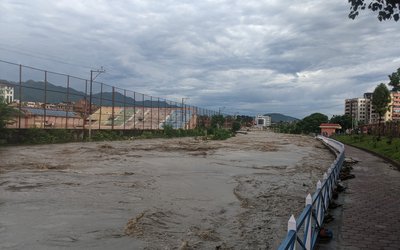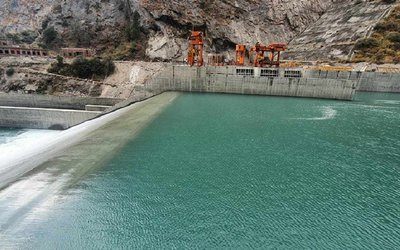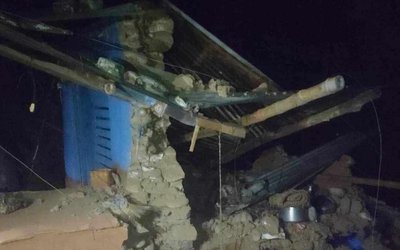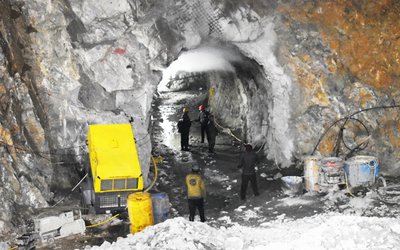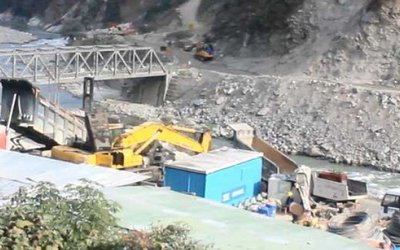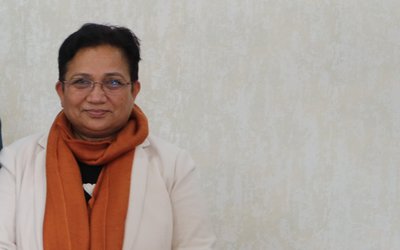
Out of Nepal Electricity Authority's total generation of over 562 MW, two German supported hydropower projects, Middle Marsyangdi 70 and Marsyangdi 69, make a contribution of almost 20 percent in total. Both the projects are peaking projects supplying electricity at the peak hours.
Similarly, German Government, through KfW, is also supporting the construction of transmission line. Add to Germany's support to renewable energy to Nepal, KfW is also supporting construction of 220 kV double circuit Chilime-Trishuli hub transmission line.
Germany remains a major development partners of Nepal supporting Alternative Energy Promotion Center (AEPC) to distribute off grid energy and expand bio-grass and solar home system.
Whether off grid or on grid, Germany's support is very important. Inaugurated by Minister of Energy, Water Resources and Irrigation Barsha Man Pun, a two-week program, The German Energiewende, Transforming Germany's Energy System, travelling Expo and Talk Program helped to understand transformation of energy sector in Germany.
The travelling exhibition illustrates the Germany's economic transformation towards reusable energy. Through the exhibition, Germany is playing a major role in climate protection and brings a message to Nepal, “let uss work together on green energy.”
Addressing the program, Energy Minister Pun thanked German government for supporting Nepal's energy sector. He expressed the hope that through this kind of support Germany will continue to help Nepal in energy sector.
German Embassy in Kathmandu is organizing a 16-day exhibition titled “The German Energiewende: Transforming Germany’s energy system.” The exhibition takes place inside the premises of Information and Communication Technology Center, Pulchwok Camus, Lalitpur from 12-26 April 2019.
The world is moving in the direction of clean and renewable energy sources. Germany is leading the movement with an objective of achieving carbon neutrality in 2050. Nepal too has potential in generation of renewable energy through tapping in to various sources like hydro-power and solar energy, but also working toward energy efficiency.
Ambassador of Federal Republic of Germany Roland Schäfer interacted with media at German Embassy regarding the sector.
The energy exhibition illustrates the German economy’s transformation towards energy sources. What is the energy transition, what milestones have been achieved and what challenges remain? It should also be an occasion to discuss challenges, we share and show appreciation for the efforts of the government of Nepal to create conducive environment towards climate friendly energy in the country.
The interactive travelling exhibition has already toured more than 80 locations in about 30+ countries and has been seen as overwhelming across the world. It is expected to be visited by students from schools and campuses, professionals working in renewable energy sector, policy makers and academics as well as anyone with interest in latest developments in renewable energy. The exhibition will be open to all free cost.
The exhibition is accompanied by a photo story about 60 years of friendship between Nepali and German citizens. The inspiring portraits of volunteers and business owners are a great way to experience intercultural exchange and tell the story of close friendship.
Germany through GIZ is supporting Alternative Energy Promotion Center (AEPC) in promotion and development of renewable energy technologies in various municipalities and rural municipalities. The energy exhibition can be helpful in generating interest and sharing the innovative project ideas suitable for Nepal among students and academics.
As Germany remains a major partner supporting energy sector in Nepal, the exhibition will help Nepal see how Germany's energy sector is transforming.
- MELAMCHI WATER SUPPLY: No Interruption During Monsoon
- Jun 25, 2025
- KOREAN RETURNEES: Successful Integration
- Jun 25, 2025
- UPPER TRISHULI-1: Engaging With Local
- Jun 25, 2025
- IME GROUP: Twenty Five Years Of Journey
- Jun 24, 2025
- NEPAL’S AIR POLLUTION: A Growing Health Concern
- Jun 24, 2025
